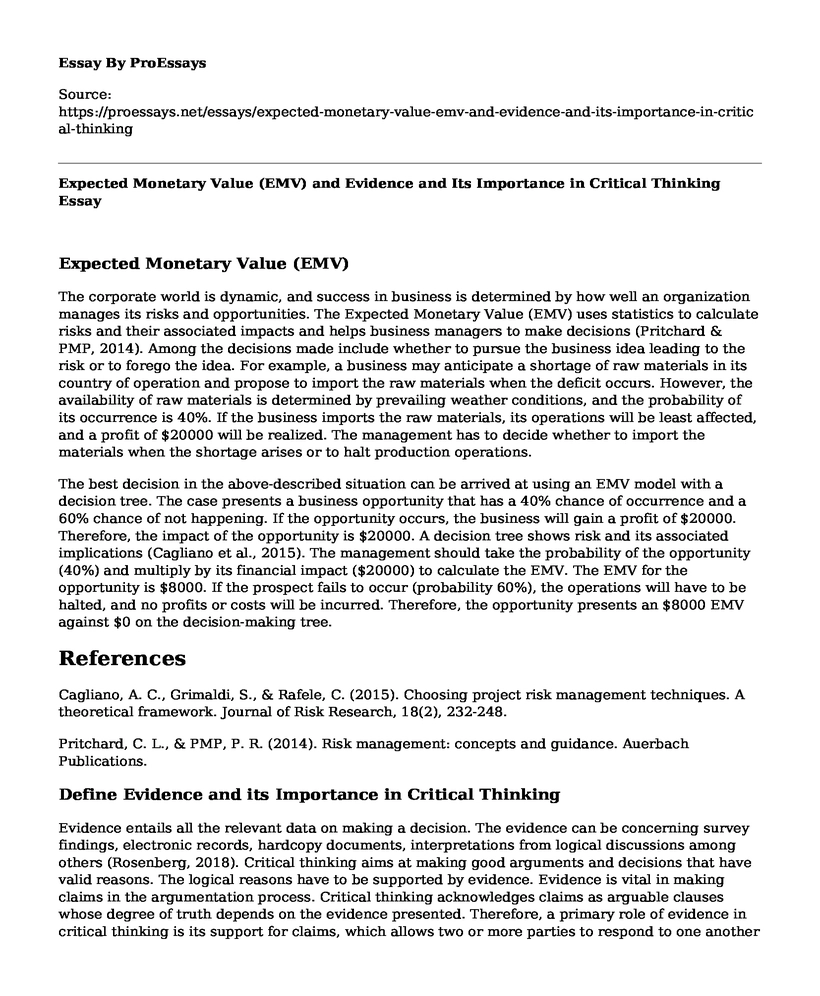Expected Monetary Value (EMV)
The corporate world is dynamic, and success in business is determined by how well an organization manages its risks and opportunities. The Expected Monetary Value (EMV) uses statistics to calculate risks and their associated impacts and helps business managers to make decisions (Pritchard & PMP, 2014). Among the decisions made include whether to pursue the business idea leading to the risk or to forego the idea. For example, a business may anticipate a shortage of raw materials in its country of operation and propose to import the raw materials when the deficit occurs. However, the availability of raw materials is determined by prevailing weather conditions, and the probability of its occurrence is 40%. If the business imports the raw materials, its operations will be least affected, and a profit of $20000 will be realized. The management has to decide whether to import the materials when the shortage arises or to halt production operations.
The best decision in the above-described situation can be arrived at using an EMV model with a decision tree. The case presents a business opportunity that has a 40% chance of occurrence and a 60% chance of not happening. If the opportunity occurs, the business will gain a profit of $20000. Therefore, the impact of the opportunity is $20000. A decision tree shows risk and its associated implications (Cagliano et al., 2015). The management should take the probability of the opportunity (40%) and multiply by its financial impact ($20000) to calculate the EMV. The EMV for the opportunity is $8000. If the prospect fails to occur (probability 60%), the operations will have to be halted, and no profits or costs will be incurred. Therefore, the opportunity presents an $8000 EMV against $0 on the decision-making tree.
References
Cagliano, A. C., Grimaldi, S., & Rafele, C. (2015). Choosing project risk management techniques. A theoretical framework. Journal of Risk Research, 18(2), 232-248.
Pritchard, C. L., & PMP, P. R. (2014). Risk management: concepts and guidance. Auerbach Publications.
Define Evidence and its Importance in Critical Thinking
Evidence entails all the relevant data on making a decision. The evidence can be concerning survey findings, electronic records, hardcopy documents, interpretations from logical discussions among others (Rosenberg, 2018). Critical thinking aims at making good arguments and decisions that have valid reasons. The logical reasons have to be supported by evidence. Evidence is vital in making claims in the argumentation process. Critical thinking acknowledges claims as arguable clauses whose degree of truth depends on the evidence presented. Therefore, a primary role of evidence in critical thinking is its support for claims, which allows two or more parties to respond to one another and reach a critical decision.
Evidence allows proving or refuting of hypotheses in critical thinking. Critical thinking holds that logical reasoning and evaluation of hypotheses leads to right decisions (Reiss, 2015). Hypotheses are mere statements aimed at guiding research and discovery of evidence in facts or figures. Reasons are assertions that support the claims made according to the evidence obtained. Moreover, exploration and evaluation of evidence guides reasoning and compels an audience to agree to a decision.
Evidence provides the body of proof required in critical thinking. Without evidence, decisions would be based on hypothetical data that cannot be empirically tested or proven in any means (Reiss, 2015). Behind every behavior and decision made by man, there exist reasons that predisposed the individual to that particular conduct. Examination of evidence reveals connections between variables and projects the expected outcome from a specific decision. Moreover, in critical thinking, evidence can be stored and used by future generations as references to theories and concepts.
References
Reiss, J. (2015). A pragmatist theory of evidence. Philosophy of Science, 82(3), 341-362.
Rosenberg, A. (2018). Philosophy of social science. Routledge.
Cite this page
Expected Monetary Value (EMV) and Evidence and Its Importance in Critical Thinking. (2022, Jul 15). Retrieved from https://proessays.net/essays/expected-monetary-value-emv-and-evidence-and-its-importance-in-critical-thinking
If you are the original author of this essay and no longer wish to have it published on the ProEssays website, please click below to request its removal:
- Social Work Leadership and Strategic Planning Essay
- Teaching Role of Health and Safety Trainer Paper Example
- Essay Example on Language Development: Exploring Perspectives With Shelia Kennison
- Research Paper on Hip Hop Culture and Its Influence on Black Community and American Politics
- Paper Example on Retired Army Major David Johnson - 70 Years & Counting!
- Essay Sample on Digital Literacy: Protecting Your Digital Reputation in Education
- Quantity Surveyors: Profession for Construction Projects Cost Management - Research Paper Sample







